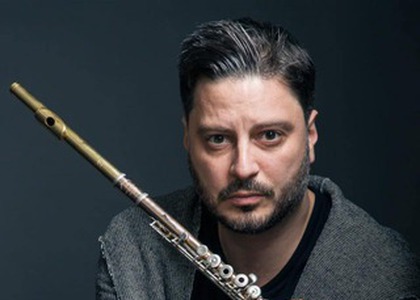> [Archived] Interviews

Interview with flutist Matei Ioachimescu
"Flute Lab", the latest project of flutist Matei Ioachimescu developed together with "The Romanian Flute Ensemble", presents today, between 11th and 23rd of March, 2023, a series of concerts under the title "inSuflu". The event will take place in eight Romanian cities. Further details are provided by the one and only Matei Ioachimescu, with whom Ioana Țintea had a few words:
Matei Ioachimescu, before we start I would like you to tell me about the latest project of yours, Flute Lab. How did you come up with this project?
It was a project I longed enough for. My two passions were my starting point, such as playing the flute and teaching, and together with my students, we've been starting a place, a sort of oasis of educationat the Faculty of Music and Theatre in Timișoara, aligning it with the international standards of performing. I dare to believe that it is perhaps the only place where this musical instrument, the flute, can be learned as it suits it, as it belongs to the West European society. And we waited a while to see how things are going, sowe finally reached the moment,where with the help of some external financial support and our partners, West University of Timișoara, Faculty of Music, Rotary Club, and so on, and all our local partners, we are able to start a wonderful programme together with six extraordinary flutists, who are actually my students, a programme which gathers many constituent parts. One of the most important parts is to bring new music, which suits the flute, in very different regions of Romania. In order to do that we created a call for artwork and there are four composers of modern art music who have some particular sonority. As a result, here we have an ensemble of seven flutists, a complete scale of flutes, from bass flute to piccolo flute, which suddenly becomes a mobile mini-orchestra. It can be brought to the most interesting regions of the country. This is how the idea of the project started, not to bring thisonly to big cities, cities with an intense cultural life, but to share this experience also with cities where the cultural agenda seems tighter. For instance, we travel to Bistrița, Focșani, we have a premiere at the Municipal Theatre, and from there we go to Brașov. We have eight places in where weperform. Moreover, me and my students thought to somehow enlarge the educational field and offer seven masterclasses, with the help of our partners. We have two days of masterclass in Bucharest at "George Enescu" Highschool, two days in Cluj, at "Sigismund Toduță" Musical College. We'll meet the young flutists from every city we stop by, hoping that our message will be more in touch with them, and to convince them that this instrument is worth being studied at international standards.
You propose a diverse programme which has a few works particularly written for concerts of woodwind instruments, which are going to be presented in the first preformance. Can you tell me more about that?
Yes, and four Romanian composers: Gabriel Mălăncioiu, George Păiș, Alin Chelărescu și Ciprian Pop, who come not only from different geographical regions of Romania, but also from different stylistic areas. This made us glad. They got the idea of our programme which is representing special new sonorities to a public that is perhaps less used to this type of music. So, the plays filtered by these musicians become very attractive, full of humour and rhythms. It is a programme that incites and attracts very much. They use a lot of extensive techniques, which is mandatory for this project, in order to provoke those performing and those who listen, to try new tendencies, new approaches, and new techniques. Thus, there are four composers for the first performance.
What is the secret of a successful collaboration between a teacher and their students, and what is the biggest reward of such a partnership?
It is a very complex thing. Firstly, it starts out of solid respect which goes both ways and continues with my appreciation and guidance towards their career, as if they already were professionals. I try to offer them a full experience, including this project. It was amazing to provoke them to organize themselves on their own, to schedule their own rehearsals, their own study time and even promoting their own project. After tens and thousands of hours of individual and collective rehearsals, they found enough time to distribute fliers across the city and to also manage social media. In other words, a whole experience, and of course, what they expect from me is technical guidance, because it is the place where we exchange daily brand new information. We are all aware that this instrument, the flute, doesn't have an ancient tradition since it is a modern instrument. We've never had a school to teach this instrument and we cannot have one because Romania is secluded, without access to information. All teachers from Romania did their best trying to create a suitable place for the flute. Any type of school is based on exchange of information to which we didn't have access, unfortunately. Today we cannot dream of a Romanian school for flute because national schools aren't in function anymore. However, we can still hope for a school of good flute practice, as we encounter it in the Western culture, and I dare to believe that starting with this wave of information, these free discussions and moments of meditation upon the best solutions, there is also this common interest for the instrument.
Translated by Mara-Sabina Rolea,
University of Bucharest, Faculty of Foreign Languages and Literatures, MTTLC, year II
Corrected by Silvia Petrescu














